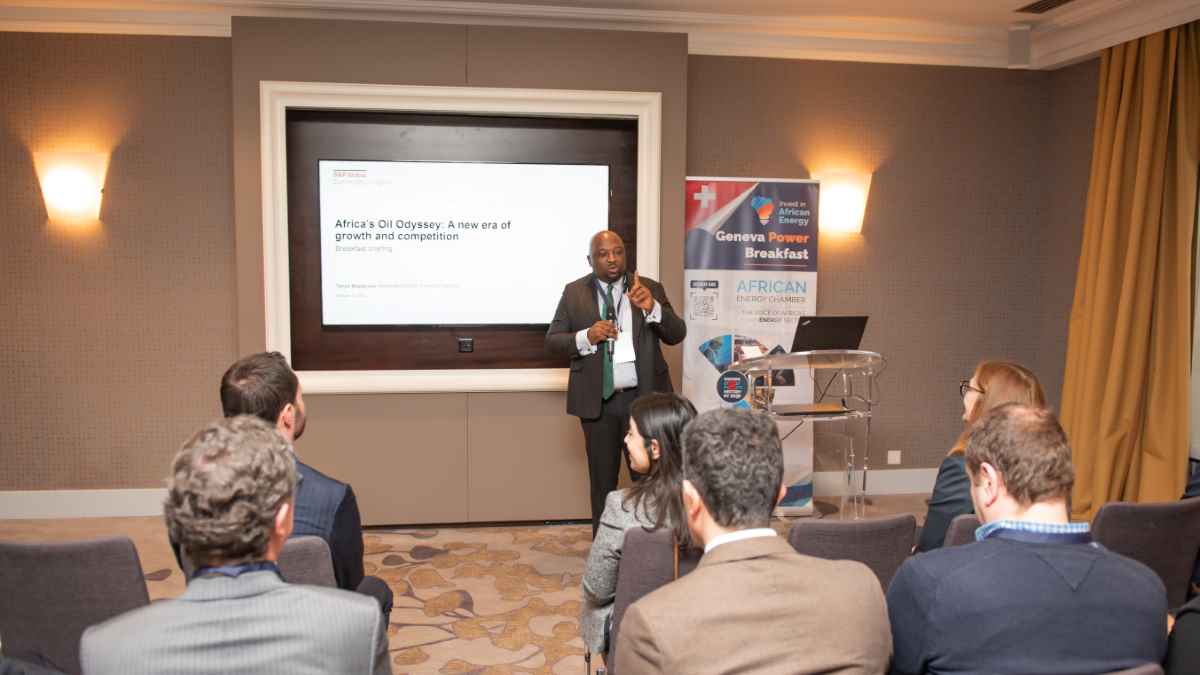CAPE TOWN, South Africa, February 24, 2025/APO Group/ –The African Energy Chamber (AEC) (
https://EnergyChamber.org/) – the voice of the African energy sector – hosted its
Invest in African Energies investor breakfast in Geneva on Friday. The event attracted a significant number of European investors, financiers and commodity traders, underscoring Geneva’s pivotal role as a global hub for commodity trading.
The event kicked off with technical presentations by industry experts from S&P Global Commodity Insights, focusing on commodity trading, downstream activities and crude oil trading in West Africa. With crude lifts from the Dangote refinery ramping up in 2025, Nigeria is set to become a net exporter of gasoline for the first time. Meanwhile, a wave of refinery rationalizations is on the global horizon, particularly in North America and Europe, with over 3 million barrels per day of refining capacity expected to shut down by 2030.
“In this context, Africa is becoming a very interesting market and a battleground for different regions targeting it as an export market,” said Tanya Stepanova, Associate Director, Commodity Insights at S&P Global, adding that several Middle Eastern NOCs are acquiring retail and refining assets – seeking to solidify or establish their presence on the continent.
The ramp-up of the Dangote refinery has reduced Nigeria’s reliance on European imports, while also supplying jet fuel to Saudi Aramco and naphtha to Asian markets and the Lomé hub off Togo’s coast, according to Matthew Tracey-Cook, Senior Price Reporter at S&P Global. Nigeria is also witnessing several other refinery developments, including the approval of a new 10,000-barrel-per-day refinery in Delta State, the resumption of operations at the Warri refinery, the planned restart of the Port Harcourt refinery and ongoing discussions to build a private refinery.
Turning to South Africa – sub-Saharan Africa’s largest and most mature market – product growth has been slower. With refineries closing, the country faces critical decisions about the future of its fuel supply, balancing trader dominance with potential Middle Eastern influence, as middle eastern NOCs are reportedly considering the acquisition of Shell South Africa’s downstream assets.
“In the long term, South Africa has ambitions to revive its refining industry. For South Africa, it’s not just a matter of refining economics — there is a strong agenda for security of supply,” said Stepanova. “The question becomes: will it become a trader-dominated market, or will we see Middle Eastern influence? This is one of the issues to watch in 2025.”
Africa is becoming a very interesting market and a battleground for different regions targeting it as an export market
Regarding Africa’s LNG prospects, the continent faces a competitive landscape as new LNG supplies from the U.S. target European markets. Emerging markets like Mozambique could see ExxonMobil reach a Final Investment Decision (FID) on its Rovuma LNG project by 2026, while anticipated developments in TotalEnergies’ Mozambique LNG project reflect upwards of $10 billion in investments.
“For LNG, the demand is certainly there, but these projects need long-term commitments, particularly from offtakers, to happen. When we look at Mozambique, ExxonMobil just said that it’s a key part of their global portfolio and they are looking at FID in 2026,” said Verner Ayukegba, Senior Vice President, AEC, adding, “The only way to drive development in Africa is through trade and investment.”
Regarding financing upstream investments, the event highlighted a recent easing of banking sector constraints following the exit of many international banks from fossil fuel financing. However, new upstream exploration continues to attract primarily major players with substantial balance sheets, though traders are playing an increasingly significant role.
“When it comes to infill drilling, sometimes the traders come in and are able to finance off the back of an existing resource base. Traders have become bigger financial players, especially when you are looking to keep production at the same level. This is what we see likely to happen in the next two to four years,” said Ayukegba.
The investor breakfast serves as a precursor to the upcoming African Energy Week (AEW): Invest in African Energies conference, scheduled from September 29 to October 3 in Cape Town, South Africa. AEW 2025 aims to position Africa as a global energy champion, focusing on strategic investments and transformative deals to shape the continent’s energy future. Building on the success of previous editions, AEW continues to be the premier platform for deal-making, energy partnerships, and capital investment in Africa’s energy sector.
AEW: Invest in African Energy is the platform of choice for project operators, financiers, technology providers and government, and has emerged as the official place to sign deals in African energy. Visit www.AECWeek.com for more information about this exciting event.
